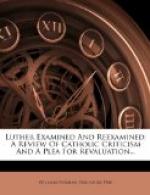“It followed of necessity that the performance of ecclesiastical duties was grievously neglected. . . . In all places incompetent persons were intrusted with the performance of clerical duties; they were appointed without scrutiny or selection. The incumbents of benefices were principally interested in finding substitutes at the lowest possible cost; thus the mendicant friars were frequently chosen as particularly suitable in this respect. These men occupied the bishoprics under the title (previously unheard of in that sense) of suffragans; the cures they held in the capacity of vicars.” (!)
In order not to extend this review too long, we shall refer only to one other Pope, Leo X. It was in the main a prosperous reign that was inaugurated by Leo X. A treaty was concluded with France, which had invaded Italy. By a diplomatic maneuver the Pragmatic Sanction was annulled, and the Lateran Council was ordered to pronounce its death-warrant. France was humbled. “All resistance was vain against the alliance of the highest spiritual with the highest temporal power. Now, at last, the papacy seemed once more to have quelled the hostile spirit which had grown up at Constance and Basel (two church councils which tried to reform the papacy, but failed), and found its stronghold in France, and at this very time it was near its most grievous fall.” Two years later Luther, not fathoming as yet the depths of iniquity which he was beginning to lay bare, published his Ninety-Five Theses.
Leo X is the Pope that excommunicated Luther. Ranke describes the closing hours of his life. The Pope had been extremely successful in his political schemes. “Parma and Placentia were recovered, the French were compelled to withdraw, and the Pope might safely calculate on exercising great influence over the new sovereign of Milan. It was a crisis of infinite moment: a new state of things had arisen in politics—a great movement had commenced in the Church. The aspect of affairs permitted Leo to flatter himself that he should retain the power of directing the first, and he had succeeded in repressing the second.” (This refers to Luther’s protest; the Pope was, of course, mistaken in the view that he had put a stop to Luther’s movement by excommunicating him.) “He was still young enough to indulge the anticipation of fully profiting by the results of this auspicious moment. Strange and delusive destiny of man! The Pope was at his villa of Malliana when he received intelligence that his party had triumphantly entered Milan; he abandoned himself to the exultation arising naturally from the successful completion of an important enterprise, and looked cheerfully on at the festivities his people were preparing on the occasion. He paced backward and forward till deep in the night, between the window and the blazing hearth—it was the month of November. Somewhat exhausted, but still in high spirits, he arrived at Rome, and the rejoicings there celebrated for his triumph were not yet concluded,




